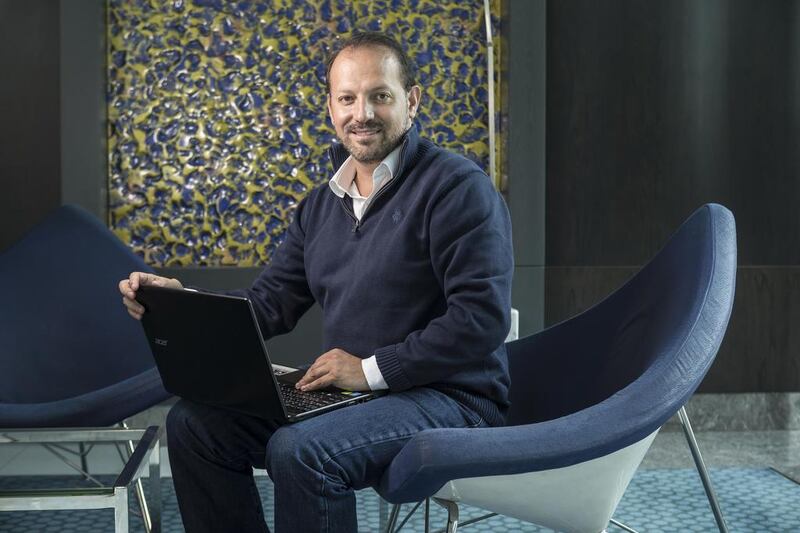Short film producer Mo Fadlallah’s vision is to set up an Arabic version of influential parenting website Mumsnet.
His start-up website, Baby-arabia.com, which features a mix of free-to-view articles and videos in English and Arabic offering advice and information on birth and parenting went live earlier this year.
The 47-year-old Lebanese-Briton has spent most of his working life producing Arabic television and videos. He says the concept fills a much-needed gap in the Middle Eastern market.
But unlike Justine Roberts and Carrie Longton, who founded influential UK-based Mumsnet in 2000, or Mona Ataya who set up the Middle East based Mumzworld in 2011, Mr Fadlallah has no personal practical experience of parenting.
__________
New projects
■ For SMEs who want to place an ad free of charge visit: https://www.thenationalnews.com/small-business-ads
__________
“People come up to me and they say, you’re a guy in your 40s, you’re still single and you’ve got no kids. Why are you launching a website about parenting and child development?” Mr Fadlallah says.
“I’m building Babyarabia to be a leading authority on baby and child development in the Mena region. It’s quite remarkable that for such a massive space it’s an area where content is desperately needed, especially in Arabic.”
Mr Fadlallah says that although there are plenty of magazine articles about parenting in Arabic, the subject is squashed between pieces about women’s fashion and celebrity gossip. The home-grown websites in Arabic focus on marketing baby-related products rather than offering advice.
“We know that digital penetration in the Arab world is very, very high,” Mr Fadlallah says. “People spend a lot of time on Facebook, Snapchat, Twitter, getting information online and these days it’s all about online videos.”
“At the same time there’s a real need for good quality content,” he says. “I read an article that said that 13,500 women in the Mena region still die each year because of pregnancy or pregnancy-related issues. There are 17,000 autistic children in Bahrain alone. They say about 20 to 25 per cent of the population in the Middle East has issues with diabetes. If I can put the right information out there and connect with a new generation of men and women at some point it will start to get through to them about what to eat, exercising, nutrition, health. I feel there is a gap which Babyarabia can fill.”
Certainly, a quick look at Baby-arabia.com gives little away about how the site is likely to make money. Articles include advice on what to eat in pregnancy and breastfeeding, birth plans, information on toddler behaviour and how to deal with tantrums. Only in the TV section is there any sponsored content with online videos sponsored by corporates such as Lego.
“For most businesses you’re looking at a two- to three-year time period before you start generating revenue. For me it’s all about year three onwards,” Mr Fadlallah says. “That’s why we’ve focused so much on building up content. It’s all about eyeballs and numbers. Once you can drive numbers to your site then it becomes easier to monetise.
With 3,000 new Facebook followers being generated each week, Mr Fadlallah says Babyarabia is well on its way to getting the kind of traffic it would need to lure advertisers. The website is also hoping to generate more traffic through sharing content with other Arabic websites, including AlArabiya.net and medical website thumbay.net.
Mr Fadlallah plans to produce 500 Arabic videos for Babyarabia each year. So far, he says, the videos he has produced for Lego have been viewed more than 500,000 times and new advertising campaigns have been agreed with corporates including Johnson & Johnson and Baby Gap.
“Our offering to sponsors is very attractive because it’s not just about banner ads,” Mr Fadlallah says. “We can create video content for you that you can use on your website. Everyone’s looking for quality content.”
But, until now, any cash generated has been more than offset against the company’s start-up costs, which include setting up the website, outsourcing the video content, outsourcing and translating the articles and marketing costs.
To run the business and provide working capital for its crucial first 18 months, Mr Fadlallah says he has raised more than US$250,000, to support the growth of the business through its first 18 months, from family and friends.
“It’s a very expensive process setting up a business in the UAE,” he says. “Yes you don’t pay tax but the charges run very high to around $7,000 to $10,000. There’s a lot of administrative work, too.”
Having already set up a production company, Integrity Media, in Dubai in 2009, Mr Fadlallah says he found it relatively simple to navigate the city’s complex rules about setting up a business. But the financial stress of setting up a new business weighs heavily on him.
“I’m going to look at women and say I know what you go through when you first get pregnant,” he says, joking. “I’ve had morning sickness, I’ve had back pain, I’ve had stress and binge eating. Because that’s what you go through when you launch a business. Whatever money you raise you have to be so careful with spending it.”
lbarnard@thenational.ae
We are on the lookout for SME success stories. If you want to have your business profiled, contact us at business@thenational.ae
Follow The National's Business section on Twitter





